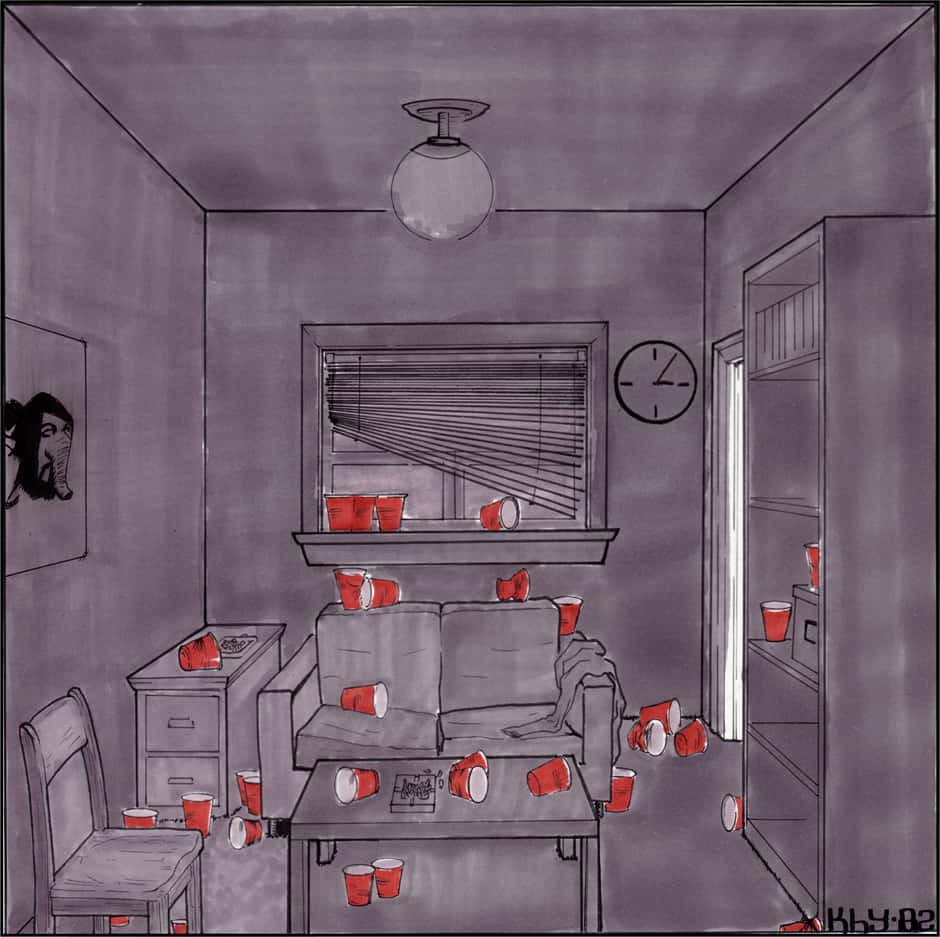Many of us have taken the opportunity to procrastinate through Facebook and Buzzfeed quizzes on our social media feeds: “What does your favourite drink say about you?”, “What kind of drunk are you?”, and, my personal favourite, “Which celebrity should you get drunk with?” But at what point does this obsession with drinking and partying cross the line from an occasional beer or two at a bar, to partying so hard that you black out on the bathroom floor?
The answer is found through an exploration of U of T’s party culture. Although more exaggerated at other Canadian universities, U of T’s St. George campus has seen its fair share of drunken undergraduates stumbling home at the end of the night, as is the norm for any school located in a major city.
Many U of T students adopt the “work hard, play hard” mantra while in university but seem to have some trouble dedicating equal focus to the work aspect. Forgoing class and letting readings pile up in favour of the far more inauspicious party option — which includes binge drinking and engaging in risky, drunken behaviour — is common practice for many U of T undergrads. Maybe it’s a fear of real life responsibilities creeping into the minds of students in the final years of their degrees — the reality of jobs, families, and mortgages — that makes irresponsible indulgence seem so attractive.
The fear of the unknown as students approach graduation becomes all too real for young adults already apprehensive to meet the upcoming responsibilities of adulthood, although many are already well into their twenties. So they party harder, stay out later, and drink more in order to compensate for the fact that when they’re out in the real world, these behaviours won’t be socially acceptable anymore.
The undergraduate experience provides many students with their first taste of real independence, as they find themselves exempt from the judgemental eyes of parents and professors when they come home at 4:00 am every night, sleep in their clothes, or arrive to class hung-over. The answer to why some students take this newfound freedom and use it as an excuse to party, while others do not, is a matter of perspective.
On the one hand, there are students like myself, who see university as an opportunity to develop good skills and habits to increase the likelihood of securing some stable and gainful employment after school ends. For that group, which I believe includes the majority of U of T students, enjoying a beer with some friends between assignments and exams is completely justified.
On the other side of the equation are those who see their university years as the only opportunity they may ever have to let loose and go wild. The appeal of frequent irresponsible partying, compounded by the relative absence of any real, immediate repercussions, is too much for some students to pass up. Some may recognize the sacrifices that go hand in hand with this lifestyle — poor sleep and work habits, slipping grades, and evaporating opportunities, but the consequences are often difficult to appreciate in the short term.
The common consensus that alcohol constitutes part of a normal, balanced university experience can be problematic for students at risk of developing long-term issues with alcohol, as well as for those who want to enjoy their undergraduate years sober without the pressure of having to drink to socialize.
A dangerous relationship with alcohol can be formed in university and fester without supervision. Many students will leave university with a few years of unhealthy drinking habits under their belts, which can lead to serious health problems down the road. Binge drinking in particular has come under scrutiny as an increasing problem in Canadian universities over the past decade. A 2004 Canadian Campus Survey confirmed that undergraduates living on university campuses are proportionately more likely to engage in “risky drinking habits” when compared to adults over the age of 24. Unfortunately, the frightening truth is that many students would not consider multiple drinks a night risky behaviour — for many, it’s just an average night out.
As a third-year student who has only legally been able to drink for less than a year, I have noticed the prevalence of problematic drinking habits on campus, as well as in the academic community at U of T. Living with binge-drinking roommates has opened my eyes to the culture of booze. More often than not, drinking is used as a means to an end; the point is to get drunk. Rather than social drinking, in which the drinker is in control of how much alcohol they consume, binge drinking entails pounding back large amounts of alcohol in a short period of time in order to maximize your buzz and induce a drunken stupor.
It is essential that everyone, students especially, are able to find resources to get help, information, or support for drinking related concerns. Organizations like U of T’s Counselling and Psychological Services, the Centre for Addiction and Mental Heath, and Alcoholics Anonymous can provide students with vital information and treatment if they are concerned that they might have developed or be developing a drinking problem. Unfortunately, until we reexamine the culture that surrounds alcohol in university, the problem is here to stay. As long as party culture is excused as a normal part of the university experience, the dangers of alcohol dependency will continue to wreak havoc among students.
Emma Kikulis is a third-year student at U of T studying English and sociology.


